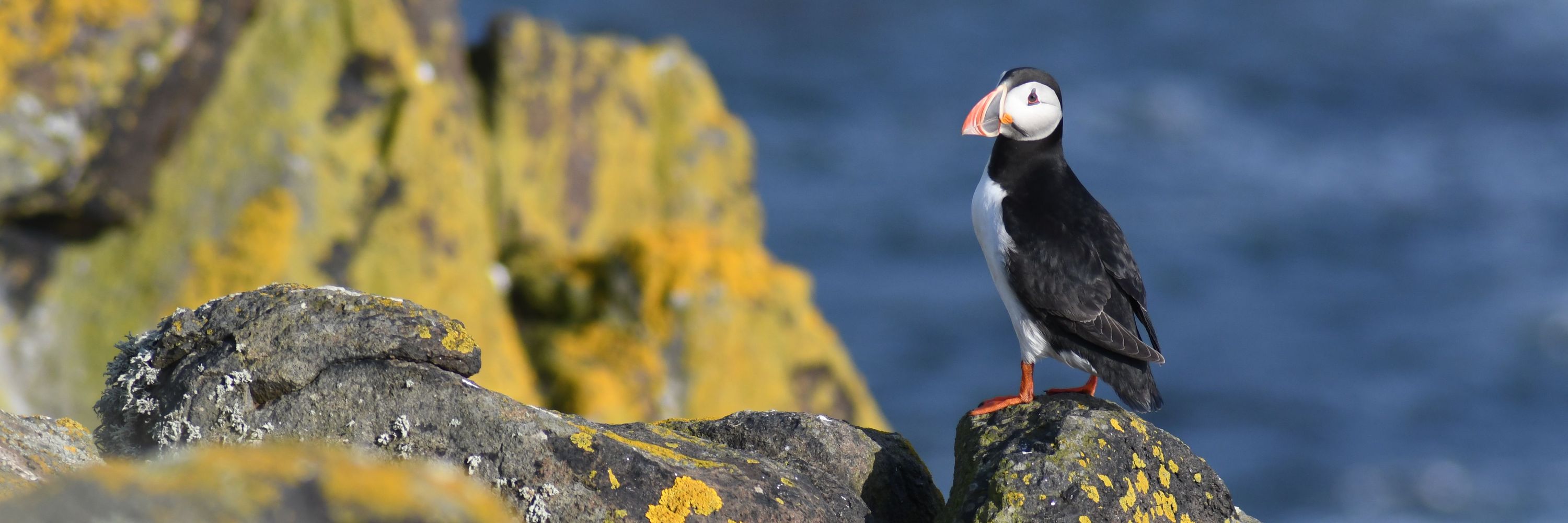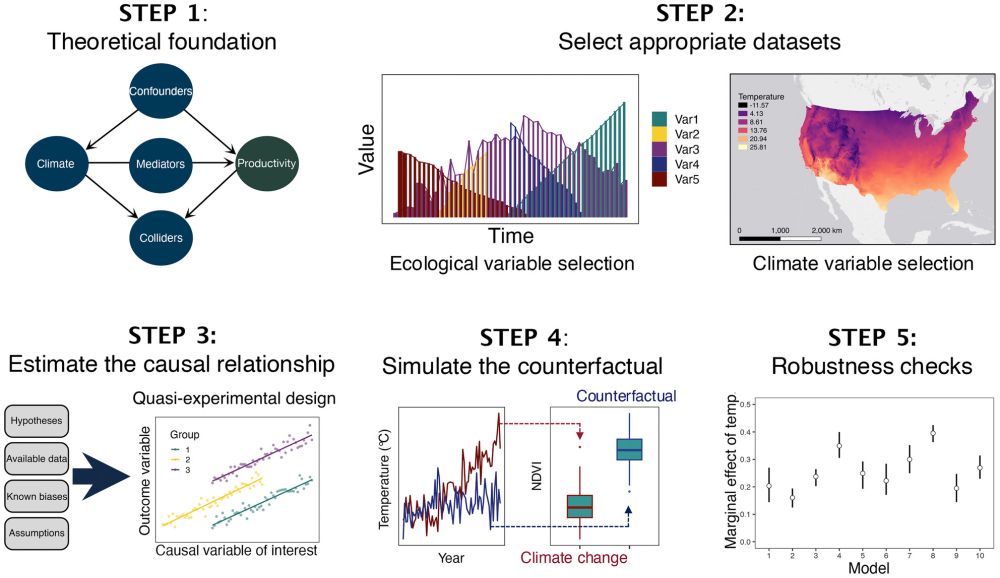
Christopher Pollock
@tonyauk.bsky.social
Quantitative Ecologist at UKCEH trying to reproduce what seabirds do at sea on a computer.
Reposted by Christopher Pollock
Granger et al. Multispecies sensory networks and social foraging strategies: Implications for population decline in procellariiform seabirds www.pnas.org/doi/10.1073/... #ornithology #seabirds

Multispecies sensory networks and social foraging strategies: Implications for population decline in procellariiform seabirds | PNAS
Multispecies sensory networks, where different species prioritize different sensory
modalities and then use heterospecific information in a likely ...
www.pnas.org
November 7, 2025 at 7:46 AM
Granger et al. Multispecies sensory networks and social foraging strategies: Implications for population decline in procellariiform seabirds www.pnas.org/doi/10.1073/... #ornithology #seabirds
Reposted by Christopher Pollock
I am recruting a #postdoc for a project investigating the evolution of avian heat tolerance in @erc.europa.eu project #HotLife. Fieldwork over broad latitudinal gradients, common-garden experiments, and more. Read more and apply👇
shorturl.at/WA1Qa
Would appreciate a re-post!
@evoldir.bsky.social
shorturl.at/WA1Qa
Would appreciate a re-post!
@evoldir.bsky.social

November 5, 2025 at 8:38 AM
I am recruting a #postdoc for a project investigating the evolution of avian heat tolerance in @erc.europa.eu project #HotLife. Fieldwork over broad latitudinal gradients, common-garden experiments, and more. Read more and apply👇
shorturl.at/WA1Qa
Would appreciate a re-post!
@evoldir.bsky.social
shorturl.at/WA1Qa
Would appreciate a re-post!
@evoldir.bsky.social
Reposted by Christopher Pollock
🐦⬛ | Wild seabirds are more likely to split up in windy weather, according to a newly published study led by #EdNapier.
The paper reveals that environmental conditions before the breeding season appear to have an impact on mate faithfulness.
Full story ➡️ orlo.uk/Zfiqf
#MustBeNapier
The paper reveals that environmental conditions before the breeding season appear to have an impact on mate faithfulness.
Full story ➡️ orlo.uk/Zfiqf
#MustBeNapier

November 5, 2025 at 9:37 AM
🐦⬛ | Wild seabirds are more likely to split up in windy weather, according to a newly published study led by #EdNapier.
The paper reveals that environmental conditions before the breeding season appear to have an impact on mate faithfulness.
Full story ➡️ orlo.uk/Zfiqf
#MustBeNapier
The paper reveals that environmental conditions before the breeding season appear to have an impact on mate faithfulness.
Full story ➡️ orlo.uk/Zfiqf
#MustBeNapier
Reposted by Christopher Pollock
NEW JOB in #ornithology and #conservation to track #seabirds from Rathlin Island and analyse data to identify foraging areas (deadline 10 Nov): buff.ly/K0zcdH8

November 4, 2025 at 7:19 AM
NEW JOB in #ornithology and #conservation to track #seabirds from Rathlin Island and analyse data to identify foraging areas (deadline 10 Nov): buff.ly/K0zcdH8
Reposted by Christopher Pollock
📢 JOB VACANCY
Marine Ornithologist - Scottish Government
Application deadline: 7 Nov
shorturl.at/tXeHn
#ornithology
Marine Ornithologist - Scottish Government
Application deadline: 7 Nov
shorturl.at/tXeHn
#ornithology

Marine Ornithologist
Do you want to use your scientific and research expertise to play an important role in decisions made on the sustainable delivery of marine renewables and the marine environment?
shorturl.at
October 29, 2025 at 8:31 AM
📢 JOB VACANCY
Marine Ornithologist - Scottish Government
Application deadline: 7 Nov
shorturl.at/tXeHn
#ornithology
Marine Ornithologist - Scottish Government
Application deadline: 7 Nov
shorturl.at/tXeHn
#ornithology
Reposted by Christopher Pollock
Great PhD linking kittiwake tracking, energetics and changing oceans. Based @ukceh.bsky.social @uofglasgow.bsky.social collaborating with oceanographers at @unistrathclyde.bsky.social 🌊 Includes fieldwork, stats training and some very cool open-ended research questions. iapetus.ac.uk/studentships...

Understanding how a threatened seabird moves across complex ocean energyscapes
iapetus.ac.uk
October 28, 2025 at 1:34 PM
Great PhD linking kittiwake tracking, energetics and changing oceans. Based @ukceh.bsky.social @uofglasgow.bsky.social collaborating with oceanographers at @unistrathclyde.bsky.social 🌊 Includes fieldwork, stats training and some very cool open-ended research questions. iapetus.ac.uk/studentships...
Reposted by Christopher Pollock
New in @natrevbiodiv.nature.com: our review of the influence of #seabirds, via their nutrient transfer, on islands & adjacent marine ecosystems 🐦🏝️🪸
We highlight knowledge gaps & future directions ✨
"The circular seabird economy is critical for oceans, islands and people": doi.org/10.1038/s443...
We highlight knowledge gaps & future directions ✨
"The circular seabird economy is critical for oceans, islands and people": doi.org/10.1038/s443...

October 27, 2025 at 7:49 AM
New in @natrevbiodiv.nature.com: our review of the influence of #seabirds, via their nutrient transfer, on islands & adjacent marine ecosystems 🐦🏝️🪸
We highlight knowledge gaps & future directions ✨
"The circular seabird economy is critical for oceans, islands and people": doi.org/10.1038/s443...
We highlight knowledge gaps & future directions ✨
"The circular seabird economy is critical for oceans, islands and people": doi.org/10.1038/s443...
Reposted by Christopher Pollock
Have you ever wondered about the disparities in #seabirds species at conferences? Are we talking about all the species?
Wonder no more. We (@thelabandfield.bsky.social @seabirdsentinel.bsky.social @ingridpollet.bsky.social) have the answer!
www.sciencedirect.com/science/arti...
Wonder no more. We (@thelabandfield.bsky.social @seabirdsentinel.bsky.social @ingridpollet.bsky.social) have the answer!
www.sciencedirect.com/science/arti...

Who gets the spotlight? Disparities in seabird research attention at scientific conferences
Seabirds are among the most threatened bird groups globally, yet research effort is unevenly distributed among species, with some taxa receiving exten…
www.sciencedirect.com
October 24, 2025 at 7:35 AM
Have you ever wondered about the disparities in #seabirds species at conferences? Are we talking about all the species?
Wonder no more. We (@thelabandfield.bsky.social @seabirdsentinel.bsky.social @ingridpollet.bsky.social) have the answer!
www.sciencedirect.com/science/arti...
Wonder no more. We (@thelabandfield.bsky.social @seabirdsentinel.bsky.social @ingridpollet.bsky.social) have the answer!
www.sciencedirect.com/science/arti...
Reposted by Christopher Pollock
And our paper is out! One curve to rule them all: a simple universal thermal performance curve for ectotherms that explains at least 2700 datasets across 39 phyla and myriad measures of performance. www.pnas.org/doi/10.1073/...


October 23, 2025 at 10:01 AM
And our paper is out! One curve to rule them all: a simple universal thermal performance curve for ectotherms that explains at least 2700 datasets across 39 phyla and myriad measures of performance. www.pnas.org/doi/10.1073/...
Reposted by Christopher Pollock
Bird migration is changing. What does this reveal about our planet? – visualised

Bird migration is changing. What does this reveal about our planet? – visualised
Bird migrations rank as one of nature’s greatest spectacles. Thanks to GPS tracking, scientists are uncovering extraordinary insights into ancient and mysterious journeys – and new threats that are reshaping them.
www.theguardian.com
October 16, 2025 at 8:32 AM
Bird migration is changing. What does this reveal about our planet? – visualised
Reposted by Christopher Pollock
Our paper, describing kittiwake nesting on offshore infrastructure, is published OA today.
There are obvious implications for population monitoring, but comparison with onshore colonies would also be an interesting extension. 🌊🌊🌊
besjournals.onlinelibrary.wiley.com/doi/epdf/10....
There are obvious implications for population monitoring, but comparison with onshore colonies would also be an interesting extension. 🌊🌊🌊
besjournals.onlinelibrary.wiley.com/doi/epdf/10....
Kittiwakes nesting on offshore oil and gas infrastructure: An emerging and under‐recorded phenomenon
You have to enable JavaScript in your browser's settings in order to use the eReader.
besjournals.onlinelibrary.wiley.com
October 14, 2025 at 4:56 PM
Our paper, describing kittiwake nesting on offshore infrastructure, is published OA today.
There are obvious implications for population monitoring, but comparison with onshore colonies would also be an interesting extension. 🌊🌊🌊
besjournals.onlinelibrary.wiley.com/doi/epdf/10....
There are obvious implications for population monitoring, but comparison with onshore colonies would also be an interesting extension. 🌊🌊🌊
besjournals.onlinelibrary.wiley.com/doi/epdf/10....
The mesmerising view which you see when lying on your back on the Bass Rock - taken during fieldwork in 2021.
October 14, 2025 at 11:20 AM
The mesmerising view which you see when lying on your back on the Bass Rock - taken during fieldwork in 2021.
Reposted by Christopher Pollock
🏔️Arctic-breeding black-legged kittiwakes show individual variation in foraging responses to glacial conditions without consequences for reproductive output
📷 © Delphin Ruche
vist.ly/48wsh
📷 © Delphin Ruche
vist.ly/48wsh

October 1, 2025 at 5:06 PM
🏔️Arctic-breeding black-legged kittiwakes show individual variation in foraging responses to glacial conditions without consequences for reproductive output
📷 © Delphin Ruche
vist.ly/48wsh
📷 © Delphin Ruche
vist.ly/48wsh
Reposted by Christopher Pollock
As others have already said, this essay by James Marriott is well worth taking the time to read. Now, back to my book if I can just prise my iPhone out of my hand for a few minutes… open.substack.com/pub/jmarriot...

The dawn of the post-literate society
And the end of civilisation
open.substack.com
September 28, 2025 at 10:48 AM
As others have already said, this essay by James Marriott is well worth taking the time to read. Now, back to my book if I can just prise my iPhone out of my hand for a few minutes… open.substack.com/pub/jmarriot...
Reposted by Christopher Pollock
Very pleased to be a part of this research contribution into the ongoing impact of HPAI on seabirds; led by @sue-lewis.bsky.social alongside fellow authors from @rspbscience.bsky.social @rspbengland.bsky.social @ukceh.bsky.social & @seabirdcentre.bsky.social
🪹 | Seabirds that survived recent bird flu outbreaks have continued to reproduce, although overall breeding performance remains notably low, according to a new study.
The study has looked at breeding success in Northern Gannets at two locations during 2023.
🔗 orlo.uk/44CaS
📸 Dave Pressland
The study has looked at breeding success in Northern Gannets at two locations during 2023.
🔗 orlo.uk/44CaS
📸 Dave Pressland

September 25, 2025 at 11:17 AM
Very pleased to be a part of this research contribution into the ongoing impact of HPAI on seabirds; led by @sue-lewis.bsky.social alongside fellow authors from @rspbscience.bsky.social @rspbengland.bsky.social @ukceh.bsky.social & @seabirdcentre.bsky.social
Reposted by Christopher Pollock
Fully funded PhD working on insectivorous bird declines with a broad range of stakeholders. Starting ASAP #ornithology #zoology #biodiversity #science #ecology
www.exeter.ac.uk/study/fundin...
www.exeter.ac.uk/study/fundin...

September 18, 2025 at 12:29 PM
Fully funded PhD working on insectivorous bird declines with a broad range of stakeholders. Starting ASAP #ornithology #zoology #biodiversity #science #ecology
www.exeter.ac.uk/study/fundin...
www.exeter.ac.uk/study/fundin...
Reposted by Christopher Pollock
Delighted to be cosupervising this funded PhD with @joewynnbirds.bsky.social on #migration in #birds #seabirds @liverpooluni.bsky.social. Start in early 2026! Register for our online briefing session. www.findaphd.com/phds/project...

To lead or to follow: disentangling the genetic and cultural contributions to long-distance seabird migration at University of Liverpool on FindAPhD.com
PhD Project - To lead or to follow: disentangling the genetic and cultural contributions to long-distance seabird migration at University of Liverpool, listed on FindAPhD.com
www.findaphd.com
September 15, 2025 at 8:21 PM
Delighted to be cosupervising this funded PhD with @joewynnbirds.bsky.social on #migration in #birds #seabirds @liverpooluni.bsky.social. Start in early 2026! Register for our online briefing session. www.findaphd.com/phds/project...
Reposted by Christopher Pollock
NetLogo 7 is here!!
✨New modern UI with dark mode
🔧Performance improvements & new features
👉Download: www.netlogo.org/download
📣 Full announcement: www.netlogo.org/announcements/
#NetLogo #AgentBasedModeling #ABM #ComplexSystems
✨New modern UI with dark mode
🔧Performance improvements & new features
👉Download: www.netlogo.org/download
📣 Full announcement: www.netlogo.org/announcements/
#NetLogo #AgentBasedModeling #ABM #ComplexSystems
September 10, 2025 at 9:00 PM
NetLogo 7 is here!!
✨New modern UI with dark mode
🔧Performance improvements & new features
👉Download: www.netlogo.org/download
📣 Full announcement: www.netlogo.org/announcements/
#NetLogo #AgentBasedModeling #ABM #ComplexSystems
✨New modern UI with dark mode
🔧Performance improvements & new features
👉Download: www.netlogo.org/download
📣 Full announcement: www.netlogo.org/announcements/
#NetLogo #AgentBasedModeling #ABM #ComplexSystems
Reposted by Christopher Pollock
Very happy to share that our paper presenting a framework for optimal movement decisions in complex landscapes has just been published in TREE @stephharris.bsky.social @jacobnabe.bsky.social tinyurl.com/d45s36y5

August 25, 2025 at 12:38 PM
Very happy to share that our paper presenting a framework for optimal movement decisions in complex landscapes has just been published in TREE @stephharris.bsky.social @jacobnabe.bsky.social tinyurl.com/d45s36y5
Brilliant read for those interested in movement ecology and how we can integrate costs (e.g. wind), gains (food) and external moderators (e.g. the "landscape of disgust" which is a new one for me) for prediction and use in conservation strategies!
www.sciencedirect.com/science/arti...
www.sciencedirect.com/science/arti...

Optimal movement decisions in complex landscapes
Understanding and predicting optimal movement decisions in complex and dynamic landscapes requires identifying the mechanisms driving movements, beyon…
www.sciencedirect.com
August 25, 2025 at 9:48 AM
Brilliant read for those interested in movement ecology and how we can integrate costs (e.g. wind), gains (food) and external moderators (e.g. the "landscape of disgust" which is a new one for me) for prediction and use in conservation strategies!
www.sciencedirect.com/science/arti...
www.sciencedirect.com/science/arti...
Reposted by Christopher Pollock
BioSS researcher Dr Ana Couto worked with a team of international scientists who tracked over 100 marine species of large vertebrates to identify the most critical locations for conservation in the global ocean. 🌍🌊
Read more here: www.bioss.ac.uk/case-studies...
#conservation #marinebiology
Read more here: www.bioss.ac.uk/case-studies...
#conservation #marinebiology

Global tracking of marine megafauna space use reveals how to achieve conservation targets
The recent Kunming-Montreal Global Biodiversity Framework (GBF) sets ambitious goals to protect, conserve, and manage at least 30% of the world's oceans in an effort to halt the loss of important mari...
www.bioss.ac.uk
August 21, 2025 at 12:47 PM
BioSS researcher Dr Ana Couto worked with a team of international scientists who tracked over 100 marine species of large vertebrates to identify the most critical locations for conservation in the global ocean. 🌍🌊
Read more here: www.bioss.ac.uk/case-studies...
#conservation #marinebiology
Read more here: www.bioss.ac.uk/case-studies...
#conservation #marinebiology
Reposted by Christopher Pollock
We are back on the Isle of May for the final bit of breeding season monitoring. Fulmar checks are now complete. We'll be sharing all the Isle breeding season results very soon. @smp-seabirds.bsky.social @theseabirdgroup.bsky.social

August 18, 2025 at 2:29 PM
We are back on the Isle of May for the final bit of breeding season monitoring. Fulmar checks are now complete. We'll be sharing all the Isle breeding season results very soon. @smp-seabirds.bsky.social @theseabirdgroup.bsky.social
Reposted by Christopher Pollock
More intense human-caused heat extremes have reduced terrestrial bird abundance - in particular in the tropics - more than other human pressures
#ornithology
doi.org/10.1038/s415...
#ornithology
doi.org/10.1038/s415...

August 15, 2025 at 7:19 AM
More intense human-caused heat extremes have reduced terrestrial bird abundance - in particular in the tropics - more than other human pressures
#ornithology
doi.org/10.1038/s415...
#ornithology
doi.org/10.1038/s415...
Reposted by Christopher Pollock
Really excited to share our new paper on #causalinference & #climatechange attribution out in #EcologyLetters today!
Are you asking "how much" or "if" climate change has impacted your system, then this paper is for you!
🧪🌏🌐🍁🌺🌱🌿
onlinelibrary.wiley.com/doi/10.1111/...
Are you asking "how much" or "if" climate change has impacted your system, then this paper is for you!
🧪🌏🌐🍁🌺🌱🌿
onlinelibrary.wiley.com/doi/10.1111/...

A Causal Inference Framework for Climate Change Attribution in Ecology
Accurately attributing ecological shifts to climate change remains a significant challenge. Here, we present an accessible causal inference framework designed for climate change attribution in observ...
onlinelibrary.wiley.com
August 14, 2025 at 1:58 PM
Really excited to share our new paper on #causalinference & #climatechange attribution out in #EcologyLetters today!
Are you asking "how much" or "if" climate change has impacted your system, then this paper is for you!
🧪🌏🌐🍁🌺🌱🌿
onlinelibrary.wiley.com/doi/10.1111/...
Are you asking "how much" or "if" climate change has impacted your system, then this paper is for you!
🧪🌏🌐🍁🌺🌱🌿
onlinelibrary.wiley.com/doi/10.1111/...
Reposted by Christopher Pollock


